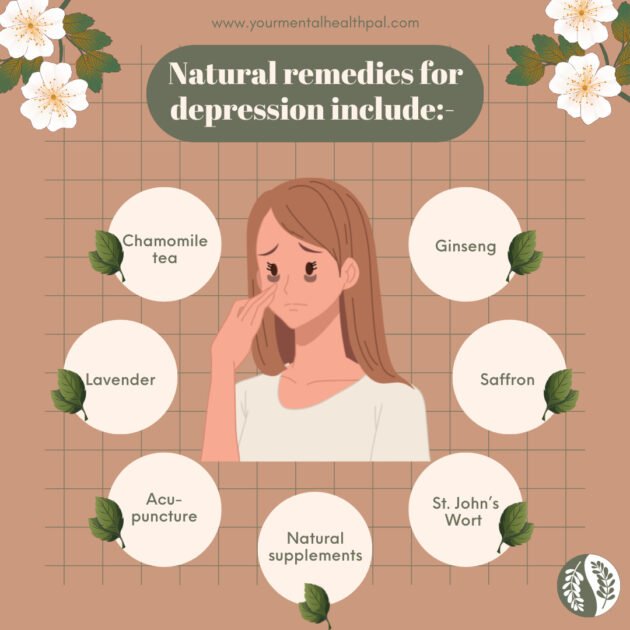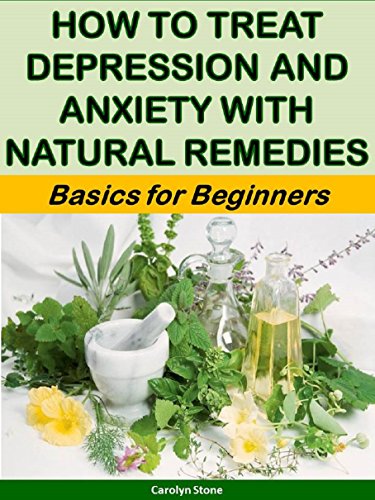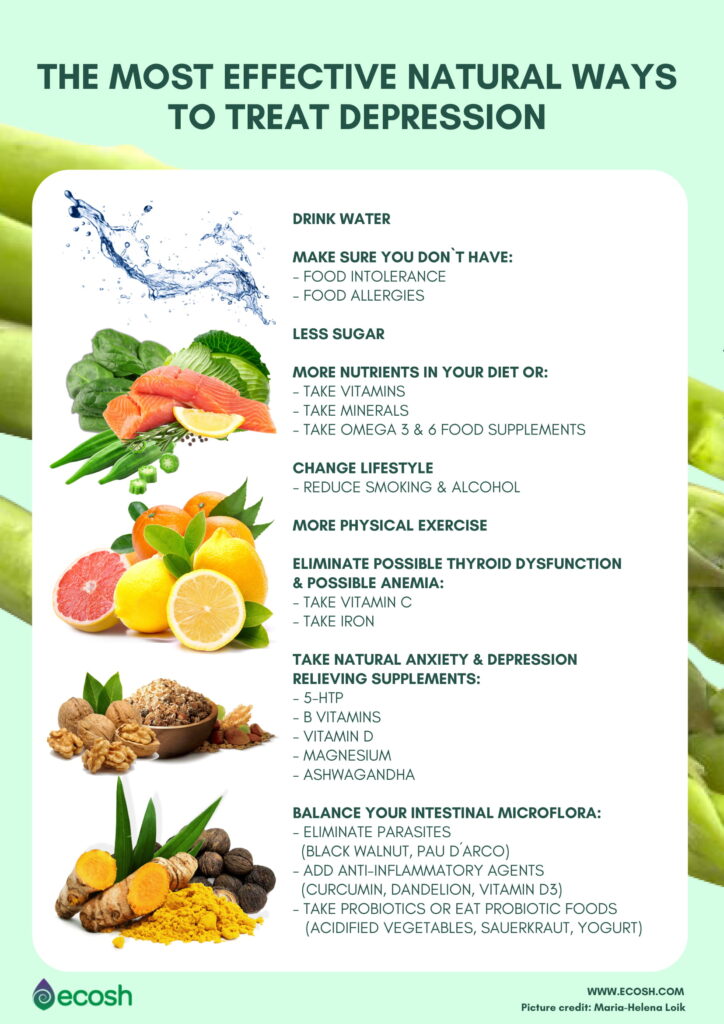Are you tired of feeling down and overwhelmed? Look no further, because we have the solution for you! In this article, you will discover a natural remedy for depression that can help uplift your spirits and bring back the joy in your life. Say goodbye to the days of relying solely on medications and hello to a holistic approach that taps into the healing power of nature. Get ready to embark on a journey towards emotional well-being and discover the secrets of this remarkable natural remedy for depression.

Understanding Depression
What is Depression?
Depression is a common mental disorder that affects millions of people worldwide. It is characterized by persistent feelings of sadness, loss of interest or pleasure in daily activities, and a range of physical and emotional symptoms. Depression can make it difficult to function in daily life and can have a significant impact on your overall well-being.
Causes of Depression
Depression is a complex condition with various potential causes. It can be triggered by a combination of genetic, biological, environmental, and psychological factors. Some individuals may be more predisposed to depression due to their family history or certain chemical imbalances in the brain. Stressful life events, such as the loss of a loved one or a major life change, can also contribute to the development of depression.
Symptoms of Depression
The symptoms of depression can vary from person to person, but common signs include persistent sadness, feelings of hopelessness, irritability, loss of interest in activities, changes in appetite and sleep patterns, fatigue, difficulty concentrating, and thoughts of self-harm or suicide. It’s important to note that experiencing a few of these symptoms does not necessarily mean you have depression, but if you consistently experience several of these symptoms for an extended period of time, it is important to seek help from a healthcare professional.
Medical Treatments for Depression
Antidepressant Medications
Antidepressant medications are commonly prescribed to help manage the symptoms of depression. These medications work by balancing certain chemicals in the brain that affect mood. There are different types of antidepressant medications available, including selective serotonin reuptake inhibitors (SSRIs), serotonin and norepinephrine reuptake inhibitors (SNRIs), and tricyclic antidepressants (TCAs). It is important to consult with a healthcare professional to determine the most appropriate medication and dosage for your specific needs.
Psychotherapy
Psychotherapy, also known as talk therapy or counseling, is another effective treatment for depression. It involves working with a trained therapist to explore and address the underlying causes of your depression. Through various therapeutic techniques, such as cognitive-behavioral therapy (CBT) or interpersonal therapy (IPT), you can learn coping strategies, develop healthier thought patterns, and improve your overall mental well-being.
Electroconvulsive Therapy
Electroconvulsive therapy (ECT) is a treatment option for individuals with severe depression who have not responded well to other treatments. ECT involves sending electrical currents through the brain to induce a controlled seizure. Although the exact mechanism of action is not fully understood, ECT has been shown to be an effective treatment for some individuals with severe depression. It is usually administered under general anesthesia and performed by a healthcare professional in a controlled environment.
Natural Remedies for Depression
Exercise and Physical Activity
Engaging in regular physical activity and exercise has been shown to have a positive impact on mental health and well-being, including reducing symptoms of depression. Physical activity releases endorphins, which are natural mood-boosting chemicals in the brain. Whether it’s going for a jog, practicing yoga, or participating in a team sport, finding a physical activity that you enjoy can be a valuable tool in managing depression symptoms.
Healthy Diet and Nutrition
Eating a nutritious diet that includes a variety of fruits, vegetables, whole grains, lean proteins, and healthy fats can play a role in supporting your mental health. Some nutrients, such as omega-3 fatty acids found in fatty fish, and certain vitamins and minerals like vitamin D and B vitamins, have been linked to improved mood and brain function. Avoiding excessive consumption of processed foods, sugary snacks, and alcohol can also help stabilize your mood and promote overall well-being.
Supplements and Herbs
Certain supplements and herbs have been studied for their potential benefits in managing depression symptoms. St. John’s wort, for example, is an herb that has been used for centuries to alleviate symptoms of mild to moderate depression. Omega-3 fatty acid supplements, particularly those derived from fish oil, have also shown promising results in some individuals. However, it is important to consult with a healthcare professional before starting any supplementation regimen, as they can interact with other medications and have potential side effects.
Lifestyle Changes for Depression
Sleep Routine and Quality
Getting sufficient and restful sleep is essential for maintaining good mental health. Establishing a regular sleep routine and practicing good sleep hygiene can help improve your mood and overall well-being. This includes creating a calming sleep environment, avoiding stimulating activities before bed, and ensuring you have enough time for quality sleep. If you’re struggling with insomnia or other sleep disturbances, it may be helpful to seek guidance from a healthcare professional.
Stress Management Techniques
Chronic stress can exacerbate symptoms of depression, so it’s important to find effective ways to manage stress in your daily life. Techniques such as deep breathing exercises, meditation, mindfulness practices, and engaging in activities you enjoy can help reduce stress levels and promote a more positive mindset. Additionally, incorporating relaxation techniques, such as progressive muscle relaxation or guided imagery, into your routine can further aid in stress reduction.
Social Support and Relationships
Maintaining strong social connections and engaging in meaningful relationships can greatly contribute to your mental health and well-being. Seek support from trusted friends, family members, or support groups who can provide a listening ear, empathy, and understanding. Sharing your feelings and experiences with others can help alleviate feelings of loneliness and isolation often associated with depression. Building and nurturing supportive relationships can provide a sense of belonging and purpose, helping you navigate through difficult times.

Alternative Therapies for Depression
Acupuncture
Acupuncture is an ancient Chinese practice that involves the insertion of thin needles into specific points on the body. It is believed to stimulate the flow of energy, or qi, throughout the body and promote overall well-being. Some studies have shown acupuncture to be effective in reducing symptoms of depression and anxiety. While the exact mechanisms are not fully understood, acupuncture may help regulate neurotransmitters and hormones in the brain, contributing to improved mental health.
Massage Therapy
Massage therapy can be a soothing and relaxing way to alleviate symptoms of depression. It promotes relaxation, reduces muscle tension, and releases endorphins, which can help improve your mood. Additionally, the physical touch involved in massage therapy can provide a sense of comfort and connection, further aiding in the management of depressive symptoms. Incorporating regular massage sessions into your self-care routine can offer respite from the challenges of depression.
Yoga and Meditation
Yoga and meditation have gained significant popularity as complementary therapies for mental health conditions, including depression. Both practices promote mindfulness, self-awareness, and relaxation, helping you cultivate a sense of inner peace and balance. Engaging in regular yoga or meditation sessions can help reduce symptoms of depression, increase mental clarity, and improve overall well-being. Many yoga practices incorporate breathing exercises, gentle movements, and meditation, creating a holistic approach to mental and physical wellness.
Positive Psychology Techniques
Gratitude Journals
Practicing gratitude has been shown to have a positive impact on mental health and well-being. Keeping a gratitude journal, where you write down things you are grateful for each day, can help shift your focus toward the positive aspects of your life. By consciously acknowledging and appreciating the good things, big or small, you can cultivate a more optimistic outlook and reduce the impact of negative thoughts and emotions associated with depression.
Mindfulness Practices
Mindfulness involves intentionally paying attention to the present moment without judgment. By practicing mindfulness techniques, such as guided breathing exercises or body scans, you can increase your awareness of your thoughts, feelings, and sensations. This increased awareness allows you to observe your experiences without reacting to them, helping to break free from negative thought patterns often associated with depression. Incorporating mindfulness into your daily routine can promote a greater sense of calm and acceptance.
Setting Goals and Objectives
Setting goals and objectives can provide a sense of direction and purpose, which is important for managing depression. Start with small, achievable goals and gradually increase the level of difficulty as you gain momentum. Whether it’s completing a household chore, learning a new skill, or pursuing a personal interest, setting achievable goals can boost your self-esteem, provide a sense of accomplishment, and help you stay motivated. Breaking larger goals into smaller, manageable steps can make them more attainable and increase feelings of success along the way.

Sunlight and Vitamin D
Effect of Sunlight on Mood
Sunlight has a powerful impact on our mood and overall well-being. Exposure to natural sunlight helps regulate the production of serotonin, a neurotransmitter that plays a vital role in mood regulation. Lack of sunlight, especially during the winter months, can contribute to a type of depression called seasonal affective disorder (SAD). Spending time outdoors, especially during sunny periods, can help increase serotonin levels and improve your mood.
Benefits of Vitamin D
Vitamin D, often referred to as the “sunshine vitamin,” is crucial for maintaining good mental health. It plays a vital role in brain function and the production of serotonin. Deficiency in vitamin D has been associated with an increased risk of depression and other mood disorders. While sunlight exposure is a natural way to enhance vitamin D levels, some individuals may require supplementation, especially during darker months or if they have limited sun exposure. Consulting with a healthcare professional can help determine if you need vitamin D supplementation.
Aromatherapy and Essential Oils
Lavender Oil
Lavender oil is widely known for its calming and soothing properties. Its fragrance has been shown to have a positive impact on mood and promote relaxation. Inhaling lavender oil or using it in a diffuser can help alleviate symptoms of anxiety and depression. Some studies have even suggested that lavender oil may be as effective as certain prescription medications in managing mild to moderate depression. However, it’s important to note that essential oils should be used with caution and in consultation with a healthcare professional.
Bergamot Oil
Bergamot oil is derived from the peel of the bergamot orange and has been used in aromatherapy for its uplifting and calming effects. Its citrusy scent can help reduce stress, anxiety, and symptoms of depression. Bergamot oil can be used topically, inhaled, or added to a warm bath to promote relaxation and a more positive mood. As with any essential oil, it is recommended to dilute bergamot oil and perform a patch test before use, as some individuals may be sensitive to its concentrated form.
Chamomile Oil
Chamomile oil is extracted from the flowers of the chamomile plant and is known for its gentle and soothing properties. It has been used for centuries to promote relaxation, reduce anxiety, and improve sleep quality. Inhaling the fragrance of chamomile oil or using it in a diffuser can help calm the mind and alleviate symptoms of depression. Additionally, chamomile tea, made from chamomile flowers, is a popular natural remedy for promoting relaxation and improving overall well-being.

Pet Therapy for Depression
Interaction with Animals
Pets can provide significant emotional support and companionship to individuals experiencing depression. Interacting with animals, whether it’s a cat, dog, or even a small pet like a hamster, can help reduce feelings of loneliness and improve overall mood. The non-judgmental presence of a pet can provide comfort and alleviate symptoms of depression. Activities such as petting, playing, or simply being in the company of a beloved pet can promote feelings of joy, love, and a sense of purpose.
Benefits of Having Pets
Having a pet can offer numerous benefits for individuals with depression. Pets can provide unconditional love and support, helping to reduce feelings of social isolation and providing a sense of belonging. The responsibility of caring for a pet can also promote a daily routine and provide a sense of purpose and structure. Additionally, activities such as walking a dog or engaging in play with a pet can encourage physical activity, which is known to have positive effects on mental health and well-being.
Music Therapy
Effects of Music on Mood
Music has a powerful influence on our emotions and can be a powerful tool in managing depression. Listening to uplifting music can lift your spirits, boost your mood, and provide a distraction from negative thoughts and feelings. Music therapy, a form of expressive therapy, involves engaging in musical activities with a trained therapist. This can include playing instruments, singing, or creating personalized playlists. Music therapy can help individuals explore and express their emotions, reduce stress, and enhance overall well-being.
Creating Personalized Playlists
Creating personalized playlists can be a simple and effective way to incorporate music into your daily life as a form of self-care. Consider selecting songs that resonate with you, evoke positive emotions, and have meaningful lyrics. Upbeat and energetic music can help boost your mood and increase motivation while calming and soothing music can promote relaxation and emotional healing. Experiment with different genres and styles to find what works best for you and create a playlist that becomes your personal musical sanctuary.
Music for Relaxation
In addition to listening to music for mood enhancement, specific types of music can be particularly soothing for relaxation purposes. Instrumental or classical music, nature sounds, or even guided meditations with accompanying music can help induce a state of calm and tranquility. Listening to relaxing music before bedtime can also aid in improving sleep quality, which is crucial for managing depression. Find what type of music resonates with you and incorporate it into your daily routine for a dose of musical therapy.
In conclusion, depression is a complex condition that can significantly impact your mental and physical well-being. While medical treatments such as antidepressant medications and psychotherapy are widely used, there are also natural remedies, lifestyle changes, alternative therapies, and positive psychology techniques that can help manage depression symptoms. Incorporating exercise, maintaining a healthy diet, seeking social support, and exploring alternative therapies like acupuncture or aromatherapy can all play a role in enhancing your mental health. It’s important to remember that everyone’s journey with depression is unique, so finding the right combination of treatments and strategies may require some trial and error. Don’t hesitate to reach out to healthcare professionals for guidance and support along the way. With the right resources and perseverance, you can take steps toward managing depression and improving your overall well-being.

Related Terms About Natural Remedy For Depression.
Best Home Remedy For Seasonal Depression, Best Natural Remedy For Seasonal Depression, Herbal Remedy For Depression And Stress, Natural Cures For Depression And Stress, Natural Remedies For Anxiety And Depression In Hindi, Natural Remedies For Anxiety And Depression Uk, Natural Remedies For Anxiety Or Depression, Natural Remedies For Cat Depression, Natural Remedies For Depression After Menopause, Natural Remedies For Depression And Weight Loss, Natural Remedies For Depression Anxiety And Stress